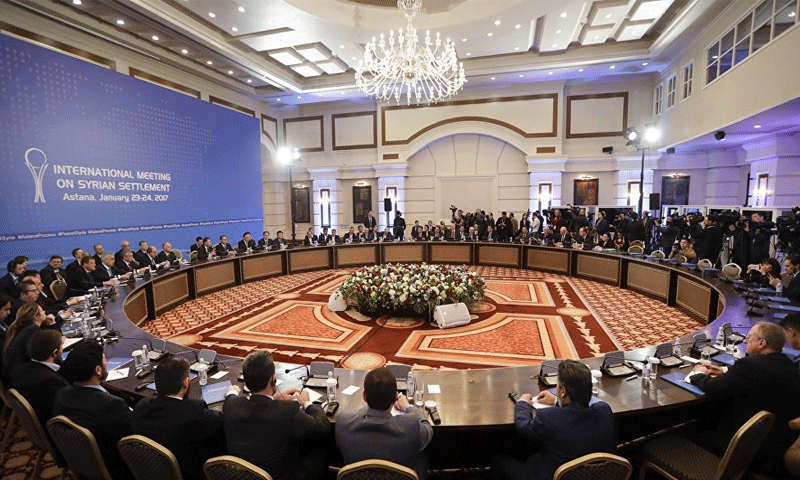



The Turkish President, Recep Tayyib Erdogan, stated that the Astana peace process for Syria, aimed at ending the Syrian conflict, has “crumbled.”
The collapse of the Astana talks has raised a question about the future of these talks and their effect on the ground.
On his flight back from Senegal, on 29 January, Erdogan said to a group of reporters that the Astana process does not exist anymore”, demanding to look at what Turkey, Russia and Iran can do to revive it.
Erdogan’s statement comes at a time when the Syrian regime forces, backed by the Russian air force, have progressed in rural southern Idlib and established control over vast areas.
Erdogan added that Russia is not abiding by the agreements of Astana and Sochi.
The Russian Intransigence
The agreement signed between Erdogan, and his Russian counterpart, Vladimir Putin, in the Russian city of Sochi in September 2018, stated to maintain the “so-called Idlib’s de-escalation zone” and that the Turkish observation posts will be fortified and continue to function.
According to the agreement, the Russian Federation will take all necessary measures to avoid military attacks or operations in Idlib, maintain the status quo and establish a demilitarized zone, 15-20 km deep in the de-escalation area.
Bakir Atacan, a political analyst, told Enab Baladi that the Turkish president had been stick to “Astana” agreements from the beginning, but on the grounds that the Syrian opposition would be a partner in the future of Syria whether in the constitution amendment or the next phase for Syria’s life.
Atacan added, “lately Russia and the Syrian regime have both refused any existence of the Syrian opposition on the ground or in the political process”. He pointed out that this refusal was manifested by bombing Idlib and disrupting the work of the Constitutional Committee.
Atacan believed what Russia, Iran, and the Syrian regime are doing in Idlib comes with an “American green light,” based on that “they are expelling terrorists from Syria. However, they are killing the Syrian people, not Hay’ at Tahrir al-Sham”.
Erdogan threats
Atacan pointed out that Ankara will abide by its agreement with Russia. At the same time, Turkey is threatening to conduct military operations on the ground only to push the other side to sit down at the negotiation table again and come up with new agreements for the region.
The Turkish president has warned of using military force to bring stability in Syria, especially in Idlib province.
Erdogan, in his speech at an extended meeting with the heads of the ruling Justice and Development Party (AKP) on 31 January, said that Turkey wants to stabilize the situation in Syria and will not hesitate to do whatever it takes to achieve that including the use of military force.
Atacan clarified that Turkey has its interests in the region and will not abandon its strategic depth. He also added that “Turkey’s strategic depth in Syria is the people with all its components and if Ankara loses the people, it will lose its interests in the Middle East, because Syria is as Turkey’s gateway to the region”.
Guarantors’ interests
Hasan al-Nifi, a Syrian political analyst, says the “Astana” deal serves the interests of its guarantors, not the interests of Syrian people.
Al-Nifi, in an interview with Enab Baladi, added that “from Astana process, Russia wanted to achieve two parallel goals at both field and political levels”.
The field goal, according to al-Nifi, is to contain the armed opposition by bringing in faction leaders and forcing them to sign major concession agreements. In other words, the field goal is to end the Syrian opposition and their resistance to the Syrian regime.
Russia wants the Turkish-backed Syrian armed opposition groups to be committed to implementing the ceasefire, at a time when Russia and the regime are violating it many times.
At the political level, Russia was able to eviscerate the United Nations resolutions to neutralize “Geneva Talks” and replace it with “Sochi Talks,” which limit the Syrian cause to the establishment of the Syrian “Constitutional Committee”.
Al-Nifi believes that “Astana” agreements that have started since the beginning of 2017 were used by the Russian and Turkish sides to manage their interests, at the expense of the Syrian national interest.
He added, “when these interests reached the stage of collision and rivalry, the conflict in Idlib exploded, and we saw that the President of Turkey explicitly saying that “Astana” is over. In practical terms, the Russian-Turkish interests have clashed, reaching a dead end. Consequently, the situation on the ground has escalated.”
Al-Nifi considered that the escalation on the ground is the result of the lack of steadfastness in the Russian-Turkish understandings. This is currently manifested in the western countryside of Aleppo, where Turkey supports the opposition factions, in the face of the advances of the Syrian regime forces in the region.
Al-Nifi concluded, “what is happening in the countryside of Aleppo reflects Turkey’s will to resist Russian influence. Moreover, what the opposition has lost in the southern countryside of Idlib such as Maarat al-Numan, and shortly Saraqib, Ankara is trying to compensate for its losses in Aleppo”.
if you think the article contain wrong information or you have additional details Send Correction